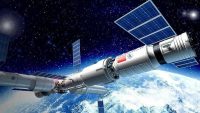But just because we can send humans into space, should we? Robots are already good space explorers. And they’re only going to get smarter in the near future.
Martin Rees, the United Kingdom’s Astronomer Royal, and Donald Goldsmith, astrophysicist and science writer, argue that the cost of human space travel largely outweighs its benefits. They talk with Ira about their new book, The End of Astronauts: Why Robots Are the Future of Exploration.
We asked you if you think space exploration still has a place for humans—or if robots should lead those activities.
Humans are high maintenance & are good for short trips. Need food, oxygen, deal with waste, radiation, temperature ranges. Bad publicity when a human dies in a space program (budget hit, proj delays)
Robots just need less resources. Look at Voyager 1 & 2. They're still going.
— FeliciaSW (@feliciahsiehsw) May 18, 2022
“It’s not a question of ‘should,’ it’s a question of ‘is.’ Robots return much more science for every dollar invested. They don’t need complex and heavy life-support systems or protection from harsh environments. They can be optimized for specific missions in ways humans can’t be.”
– Pace A., via Facebook
“Yes, much cheaper to explore without maintaining the adaptation to extreme environments needed for humans.”
– Rich W., via Facebook
“Yes. Robotics can do so much for do little. Send a thousand robots to explore all reaches of our solar system and we will see and learn so much for less cost and no risk to human lives.”
– Chuck M., via Facebook
“Humans should go when it makes sense. But most missions should be robots, because it’s cheaper and that means you can send more missions and many more missions for the same cost.”




GIPHY App Key not set. Please check settings